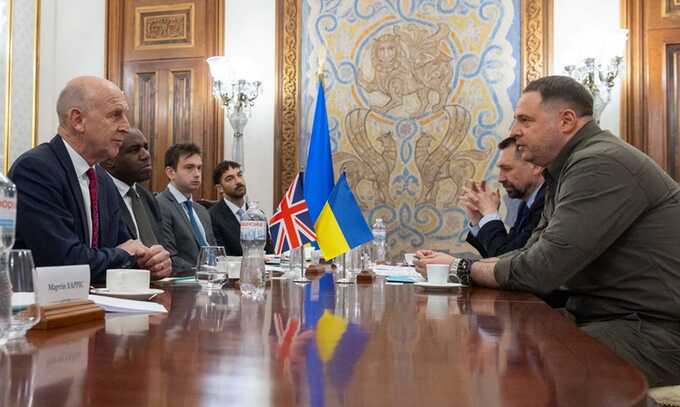Lammy and Healey visit Ukraine to say Labour would keep up UK’s backing
Shadow foreign and defence ministers go to Kyiv ‘to ensure we take politics out of the UK’s support for Ukraine’
Britain’s shadow foreign and defence ministers have completed a visit to Kyiv to deliver a message that little would change when it came to British support for Ukraine if Labour won the general election expected later this year.
“We wanted to come now, in the run-up to the UK election, to ensure we take politics out of the UK’s support for Ukraine,” said John Healey, the shadow defence secretary, in an interview with the Guardian in Kyiv before leaving Ukraine. “There’s total support for Ukraine across the full breadth of the Labour party in and outside parliament,” he added.
Healey said Labour backed all the commitments made to Ukraine by the current government, including a recent pledge to provide Kyiv with £3bn of military aid a year, which a future Labour government would continue.
He made the two-day trip to Ukraine with David Lammy, the shadow foreign secretary. The pair met Ukraine’s defence and foreign ministers as well as Andriy Yermak, the chief of staff of the president, Volodymyr Zelenskiy.
Lammy said he believed the Russian president, Vladimir Putin, represented a “new fascism in Europe” and that other nations had to stand firm in defending Ukraine.
“The message that John and I bring is that there may be a change of government in the UK this year but there’ll be no change in our policy to stand with the people of Ukraine,” said Lammy, contrasting Britain with some other allies for whom support for Ukraine had become a contested political topic. The Labour leader, Keir Starmer, visited Kyiv last February and met Zelenskiy.
Lammy claimed that a Labour government would do more to tackle London’s reputation as a centre for laundering dirty money, and to improve work on sanctions enforcement, a topic he said had come up in meetings with Ukrainian officials. “We do believe there are some real issues that have not been fully dealt with in relation to London as a laundromat for the world’s oligarchs,” he said.
He added that Labour would work to create better synergy between the Foreign Office and the Treasury to ensure proper enforcement of sanctions, and would also pursue a more aggressive sanctions policy against figures linked to Russia’s war effort. “It’s not clear to us why we often see the US and Europe move to sanction individuals and the UK left behind,” he said.

David Lammy (left) and John Healey (centre) told Andriy Yermak (right) that UK commitment to Ukraine would continue under a Labour government. Photograph: Anadolu/Getty Images
The pair said Ukrainian officials had described the current time as a “critical moment” in the war with Russia, as Moscow’s troops launch a new offensive in the Kharkiv region and Kyiv’s forces are stretched by dwindling manpower and a weapons shortage partly caused by a delay in the approval of a major US aid package.
“Clearly now that there is a full complement of aid from the United States, from the EU and from [the UK], they are in a stronger position, but they are not where they would have liked to have been had there not been the delays, and therefore the immediate months are tough,” said Lammy.
The political situation in the US, before a presidential election this year, looks more complicated than that in Britain when it comes to Ukraine. Many in Kyiv fear what a new Donald Trump presidency might mean.
Lammy, who as a Labour backbencher was fiercely critical of Trump, has made a push recently to show that a potential future Labour government could work with Trump if he were elected. Last week, he travelled to the US to meet Republicans and gave a speech saying he would seek to find “common cause” with Trump.
In Kyiv, he declined to answer on what Trump personally might do or say with regards to Ukraine, but said he felt the wrangling in Congress over aid had distorted the picture when it came to Republican views.
“There is a breadth of opinion across the Republican party, which I don’t think is sometimes properly conveyed in the UK, and I would say that the significant majority opinion certainly in the Republicans in the Senate supports the Ukrainians and supported that aid,” he said.
Read more similar news:
Comments:
comments powered by Disqus


































